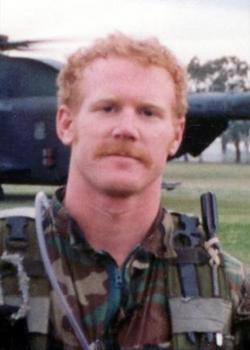
Neil Roberts, 32, a Navy SEAL based in Norfolk, Va., tumbled out of his helicopter but apparently survived the fall and was shot on the ground.

| Petty Officer 1st Class Neil Roberts, 32, a Navy SEAL based in Norfolk, Va., tumbled out of his helicopter but apparently survived the fall and was shot on the ground. |
Neither stealth nor evasion is a strong point of the Chinook, which retired Army Ranger Will Garner likens to a "gutted bus." These high-tech workhorses announce their arrival even when they are just silhouettes in the night sky.
"You can hear those things from a mile away," Garner says. "Two heavy rotors — whoop, whoop, whoop. You'd have to be stupid not to know: Here come the Americans."
One Chinook sank into a high valley near a series of peaks, beginning its mission to land a special forces team. The chopper was doubly vulnerable — low enough for ground fire to reach it, yet so high above sea level that the air grabbed by the blades was too thin for the aircraft to fly at its best.
At about 3:30 a.m. Monday in Afghanistan, it tried to land on a slice of wilderness known in military jargon as a "Hot LZ," or hot landing zone.
A rocket-propelled grenade was fired. It bounced off the chopper, but not harmlessly. Although the grenade did not explode, it caused hydraulic fluid to leak.
Overhead, an unmanned Predator drone kept watch on some of the unfolding chaos, sending images back to commanders.
As described by officials at the Pentagon, Roberts fell out as the stricken chopper veered up and away toward safer ground. But the commander of operations in the region, Maj. Gen. Franklin L. Hagenbeck, suggested the helicopter landed, then was hit and everyone except Roberts piled back in as it staggered off.
At the Pentagon, war commander Gen. Tommy Franks said Wednesday that as far as he knew, "the petty officer, in fact, fell out of the aircraft."
But he cautioned that he had talked with several people who were there or reviewed the operation, and each gave him a different account.
In either event, the Chinook flew to a somewhat safer area before coming to a jarring landing.
As for Roberts, said Hagenbeck, "We saw him on the Predator being dragged off by three al-Qaida men."
Officials did not say whether Roberts was taken away and killed or whether he was already dead, and his body was being removed. They said earlier he had been shot but they did not know when.
"We know a fine American is dead," Defense Secretary Donald H. Rumsfeld said Wednesday. "It is not whether the bullet hit him from ground fire while he was still in the helicopter or after he fell to the ground and hit by ground fire, or after someone came up and shot him again. We may never know that."
The companion helicopter swooped in and picked up the troops and crew from the grounded chopper.
After depositing the crew in a still-safer place, the second Chinook went back to the danger zone to look for the missing man and put troops on the ground.
At that point, the troops did not know whether their mission would be to rescue a survivor or recover his body, said Marine Maj. Ralph Mills, speaking for the U.S. Central Command. He said Roberts was later found dead from a bullet wound and his body was recovered.
Why go back into the hot zone? "We don't leave Americans behind," said Brig. Gen. John Rosa at the Pentagon.A refusal to leave the stranded or dead from a downed helicopter also motivated U.S. troops in the 1993 Somalia fire fight that killed hundreds of Somalis and 18 American soldiers.
When the troops got off the second chopper, an intense exchange of gunfire erupted. The Chinook flew off as the men stood their ground. "A helicopter is not going to remain in a hot area," Mills said. "It's nothing more than a target."
Night was slipping into day.
About 31/2 hours after the first Chinook was struck — and with other aircraft swarming in the skies to support Americans on the ground — two other helicopters zeroed in on an area a few miles away.
The first in this pair took ground fire as it was coming in — machine gun fire, a rocket propelled grenade, or both. It, too, went down hard, Rosa said. "That airplane could not fly. "
The soldiers in that helicopter rushed out, and into more withering gunfire. Six of them died, Rosa said.
The second chopper in this pair got its troops on the ground and left.
With the Americans at greater strength, they were apparently wearing their foes down. "They were able to suppress the enemy eventually," Mills said.
Vacating the site of the second grounded chopper, the soldiers recovered Roberts' body, Rosa said. Finally, one or two more helicopters swarmed in and evacuated
everyone.
BACK
War & Loss-Krissy's Pages